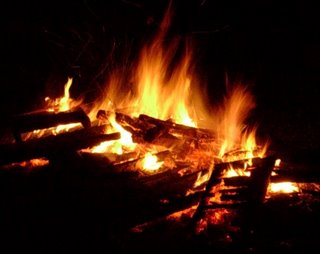
I've never been to a more lively conference in my life before.
[...] Got up at around 7ish to get showered and dressed up for this conference entitled "International Law and the Question of Western Sahara". It was one of these events that our lecturer "strongly encouraged" us to attend. But only one other person in my class was there.
I guess a bit of 'background' is necessary to explain what this is all about.
Western Sahara is a piece of terrirtory on the Northeast African coast, currently under Morrocan occupation. The Saharawi (people of the territory) have been claiming their right to self-determination since the seventies, when the colonial power Spain basically (like in many decolonialisation contexts) simply abandoned the territory. Morroco invaded, and has been occupying it since. In 1976, the International Court of Justice gave an advisory opinion which decided that Morroco and Mauritania have no legal ties to the territory, and that the people of Western Sahara must still realise their right to self-determination. Deportations, grave human rights abuses, intimidation, construction of (Morrocan) settlements and a wall...the situation is somewhat akin to the Palestinian Occupied Territories, with the occupying power illegally annexing territory rightfully belonging to the indigenous people, in contravention to international law.
Well, I turned up and sat down... the first presentations were somewhat slow and made me doze off... then things took a turn. Unsolved issues are often unsolved because they're controversial, and certainly when law and politics are often so closely intertwined, people are going to be personally interested and affected in what is said. A number of people were all too eager to take the microphone and contradict what the speakers said. 'Contradict' is perhaps mild...more like attack, deface, and accuse speakers of lying and spreading propoganda. English, Arabic, Spanish, Italian, French all mingled together like scene from 'Lost in Translation'. Throwing fits, raising their voices and hands. It was an academic exchange out of hand, at some points, with people interrupting and shouting across the room, accusing the organisers of being impartial and biased. Swear words were used... 'f*ck off', said a speaker to an unruly person from the audience. Someone said that the UN "had f*cked my country over"...twice. My friends and I sat there astounded, and were actually getting very afraid someone might just pull out a machine gun and go on a shooting spree. Security guards and police came and stayed around for the rest of the day.
At the end we were all exhausted... not once did I doze off again, and sat in my seat, transfixed to the heated exchanges and remarks. To be fair, the conference overall was delightfully educational, especially presentations by many leading scholars in the field. Of course we're no more closer to a solution, and the people of Western Sahara are probably no more closer to reaching complete independence, but at least it was (for the most bit) constructive dialogue. And it's these kind of dialogue, communcation, mutual understanding that are necessary to avoid misunderstanding and eventually work toward an acceptable, peaceful, and democratic solution acceptable to all. Given that my alma mater, SOAS, is the specialist in Asian/African affairs, no less than three scholars were present there, which made me somewhat proud.
I guess the problem with places like Western Sahara, Palestine, West Papua, or some might even argue Tibet and Chechnya (for a whole list, see Unrepresented Nations and Peoples Organisation), is that we all know and recognise the inherent rights of the people living there to self-determination, and eventual independence. But really, politics, and more specifically real politics and superpower politics trump over people's rights. Blatant violations of international law, horrendous abuses of human rights and absolutely indisputed illegal acts of occupation are viewed with such complacency and indifference, because the interested parties are unwilling to surrender their self-interests. And who suffers most of all, as in all games of power play?
It is the people. The millions of men, women and children subjected to incessant violence, grievous violations and brutal deaths, while a select few bicker, confer and argue.
Disclaimer:
Opinions expressed are entirely my own and are partial and may have been dramatised. In no way should it be taken as an accurate account of the events that occurred and/or opinions expressed at the conference.




























